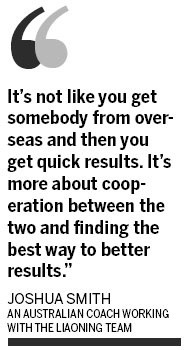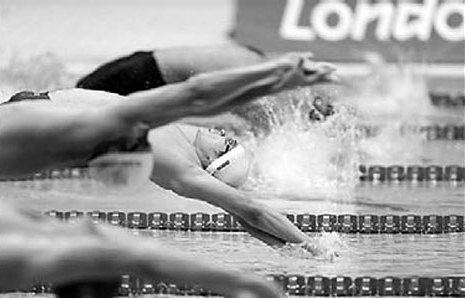A little help from the West for swimmers
Updated: 2013-05-03 07:36
By Sun Xiaochen (China Daily)
|
||||||||
|
China's Cheng Feiyi competes during the men's 100m backstroke semifinals at the 2012 London Olympic Games on July 29. Under the guidance of Australian coach Joshua Smith, Cheng reached the final, where he finished eighth. Fei Maohua / Xinhua |
Once everyone adapts, foreign coaches are proving their worth
The influence of foreign coaching on Chinese swimmers has been profound in recent years, but it's not all smooth sailing in national and international pools.
China's Sun Yang, Ye Shiwen and Jiao Liuyang claimed five gold medals at the 2012 London Games and all three benefited from intensive national squad training camps in Australia. Meanwhile, provincial teams have begun drafting foreign experts into their programs.
However, success in the pool requires more than meshing local talent with foreign expertise.
Mutual effort is required to close the huge gaps in language, culture and doubts about the implementation of new ideas.
"Foreign coaches can have an impact, but it's not always a magic fix," Joshua Smith, an Australian coach who was hired by the Liaoning provincial team in 2011, told China Daily during the National Championships last month.
"It's not like you get somebody from overseas and then you get quick results. It's more about cooperation between the two and finding the best way to get better results."
His sentiments were echoed by national team head coach Yao Zhengjie, who reminded local sports authorities to "sharpen their eyes".
"Not everything from the West is suitable for Chinese swimmers," Yao said. "Local teams should do better scouting jobs and pick the right swimmers based on their own needs, not just fame."
Hailing from Queensland, a cradle of Australian swimming talent, Smith has worked with renowned coaches like Denis Cotterell and Ken Wood, who instructed Sun and Ye in pre-London camps respectively, and learned from them how best to play his trade in China.
The first challenge is obviously the language barrier.
"Trying to convey and translate without using language is a very hard thing. You have to try to get your points across and you physical movements across without being able to say it directly," said the 34-year-old Smith, who is coaching abroad for the first time.
A knowledgeable, conscientious interpreter is hard to find, but Smith and compatriot Scott Munro, who serves as the team's fitness coach, found one.
"He (Liaoning's translator, Kang Kai) helps us a lot to get (our points) across to the athletes. It's important for the translator to know swimming, at least some of the concepts," Munro said.
Making Chinese swimmers understand the plan is one thing - getting them to accept it is another.

Having worked with the Liaoning team for more than 20 months, since August 2011, Smith has become very aware of the cultural differences between the two countries. Whereas the Aussies can be open and talkative, the Chinese are often more guarded and focused on their own business.
"There is a culture barrier. If they have trained in a certain way and are not willing to give it up and embrace my program ... you won't get the results."
Munro agreed.
"I think everyone should adopt new ideas no matter where they come from. I always listen to Chinese coaches, and it's cool that they listen to us too."
Smith has not sold his expertise through words, but through a hard work ethic and improved results.
In trying to establish himself with the Liaoning team at the start, Smith had to make a lot of personal sacrifices. He flew back to Australia just two days before his wedding ceremony (on Oct 21, 2011) and stayed with his new bride for only two days before returning to the squad's training base in Dalian.
Still, Smith said his family is fine with his decision to work in China and he has never regretted accepting the offer.
Once mutual trust was established, athletes under Smith's guidance began delivering results.
At the London Games, Wang Haibing finished fourth in the women's 4x100m freestyle relay while Wang Shijia finished sixth in the women's 4x200m free event.
Men's backstroker Cheng Feiyi placed eighth in the 100m.
Despite a lack of medals, it was the province's best effort at the Olympics.
The athletes have attributed their progress to Smith.
"He really started to make a difference once we adopted to his programs," said men's freestyle sprinter Ban Bao, who had a personal best on his way to a bronze medal in the 50m freestyle at the National Championships.
"He always tries to keep close to us and tries to encourage us. It's just like he's a friend - not the typical serious coach-athlete relationship.
"He makes us more willing to practice hard and push ourselves," said the 22-year-old.
sunxiaochen@chinadaily.com.cn
(China Daily 05/03/2013 page23)

 'Taken 2' grabs movie box office crown
'Taken 2' grabs movie box office crown
 Rihanna's 'Diamonds' tops UK pop chart
Rihanna's 'Diamonds' tops UK pop chart
 Fans get look at vintage Rolling Stones
Fans get look at vintage Rolling Stones
 Celebrities attend Power of Women event
Celebrities attend Power of Women event
 Ang Lee breaks 'every rule' to make unlikely new Life of Pi film
Ang Lee breaks 'every rule' to make unlikely new Life of Pi film
 Rihanna almost thrown out of nightclub
Rihanna almost thrown out of nightclub
 'Dark Knight' wins weekend box office
'Dark Knight' wins weekend box office
 'Total Recall' stars gather in Beverly Hills
'Total Recall' stars gather in Beverly Hills
Most Viewed
Editor's Picks

|

|

|

|

|

|
Today's Top News
Shenzhou X astronaut gives lecture today
US told to reassess duties on Chinese paper
Chinese seek greater share of satellite market
Russia rejects Obama's nuke cut proposal
US immigration bill sees Senate breakthrough
Brazilian cities revoke fare hikes
Moody's warns on China's local govt debt
Air quality in major cities drops in May
US Weekly

|

|








